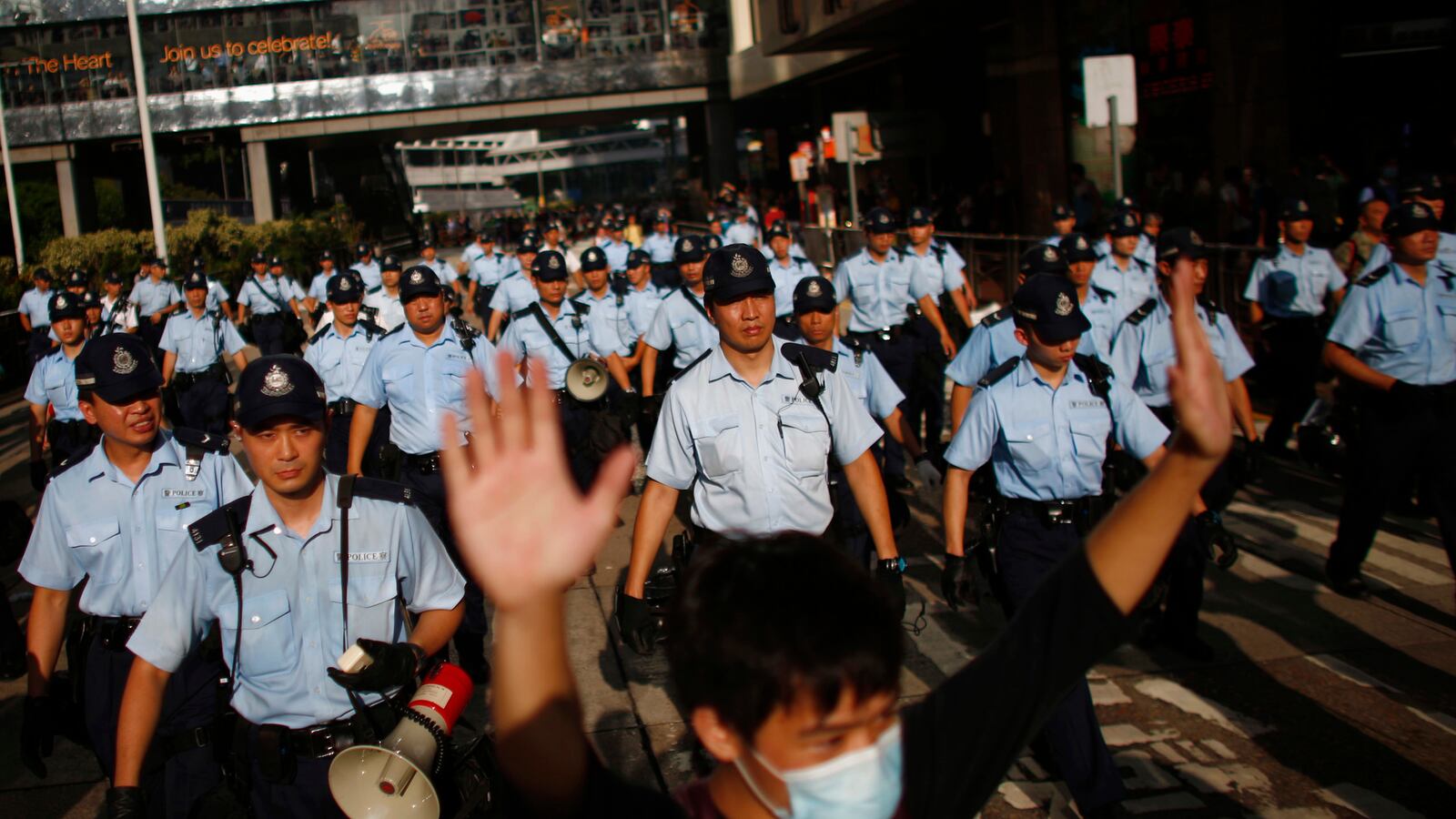HONG KONG — Of the many thousands who have turned up to protest and camp on the streets of Hong Kong over the past week, one group of protesters has gained a lot of attention not only because it’s the noisiest, but because it’s made up of Hong Kong’s ethnic minority residents.
When The Daily Beast came across this group of Indians, Pakistanis, Bangladeshis, and Nepalese in the shopping district of Causeway Bay one evening this week, they were chanting the same chants as other Hongkongers, but with more fervor and more volume than most. Which at first is a little surprising when you consider that many have long felt rejected by the same people they’re now marching alongside.
Day after day, night after night, the protests have focused on specific issues about the election process for the next chief executive of Hong Kong and calls for the resignation of the present one, CY Leung. Those demands may or may not be met. But what the demonstrators have shown is just how strong the separate identity of Hong Kong remains in the hearts of its residents.
Some members of this group of demonstrators in Causeway Bay are third- or even fourth-generation Indian-Hongkongers—born and bred locals. They speak the lingo, they’ve been educated locally and they pay their taxes like everyone else. Yet, for whatever racist and discriminatory reasons, successive governments stretching back to British colonial times have never given them full citizenship in Hong Kong.
To qualify for this, you must attain “three stars” on your Hong Kong ID card, based on several criteria and what often appear to be very subjective judgments by the authorities. Some of those protesting here don’t even have one star, even though they have lived in Hong Kong for decades. And if it weren’t for a back-up ID or passport from their other homeland in South Asia, a number of these people would be stateless.
Adding insult to injury for these ethnically distinct residents, discrimination and racism are rife on a daily basis. So why should any of them feel compelled to come out, chant as loud as they can, shoulder-to-shoulder with a population that has treated them so badly?
Jeffrey Andrews, a social worker at Christian Aid and a third-generation Indian-Hongkonger, tells The Daily Beast that the reasons are simple:
“We, like everyone else in Hong Kong, feel betrayed by [Chief Executive] Leung Chun-ying’s broken promise of universal suffrage by 2017,” says Andrews. “He needs to engage in dialogue. But instead, he orders the police to fire tear gas at protesters—that is very un-Hong Kong like. That’s what brought me out—us out—onto the streets. I’ve no confidence in his leadership.” In short: the same reason that has driven others onto the streets.
But for Andrews and his friends, while they don’t dwell on the matter, the risks are higher than for other residents, and he reserves his harshest criticism for the police force, whose neutrality and strong-armed tactics have alienated many locals and civic groups in recent years.
“Our skin color’s different and we look different. That makes us very easy targets in any protests. We could be randomly detained or harassed in order to make an example of us. And I don’t have the three stars on my ID card, so I have much more to lose than most by being here,” Andrews says as he keeps being interrupted by new Cantonese friends he’s met over the past week and passers-by who stop to greet him.
“But we’re not scared anymore,” says Andrews, “This protest is a turning point for Hong Kong and we must play a part in securing its future.”
Another of his friends, Ansah, a Pakistani, says she finally “feels accepted by the locals,” then shows us a message on Facebook by a Cantonese protestor called SMJ Lam who wrote of the group, “I don’t agree with ethnic ‘minority’ because I believe we all have one single identity: people of Hong Kong.”
One factor uniting the people here, especially the protesters out in the streets, is a shared suspicion of the Chinese mainlanders flooding into Hong Kong.
Jasu, a petite 17-year-old fourth-generation Hongkonger of Indian descent, was born just two months after the 1997 handover back to China. She was still on the street in Causeway Bay past midnight, defying her parents’ orders, and she was quite clear about where her anger was directed: not just at CY Leung, but at the sheer number of mainland Chinese who have settled in Hong Kong during her lifetime. “It seems like the whole of China is here: They’re not well-mannered; they pee on the floor and are so uncivilized,” she said.
In truth, those words could easily have come out of any Hongkongers, who are so deeply hostile to their mainland cousins they describe them as “locusts.”
Like Jasu, her gangly Pakistani friend, Usama, shares these concerns. But what ultimately drove these two teenagers to stay out late to protest, skip classes and risk getting punished by their schools for unexplained absence?
“This is our future,” says 16-year-old Usama, who, like Jasu, has only ever lived under Chinese rule. “People think we’re young, ignorant and naive, but we’re not. Our teacher told us our future matters. He’s not supposed to, but I’m glad he did.”
Over in Kowloon at the notorious, rat-infested Chungking Mansion that is the urban jungle of cheap hotels, shady businesses, curry dens and West African mobile phone sellers, Indian grocer Harish Singh tells us that while he will abstain from protesting, he fully supports the civic action.
“For 25 years, I’ve lived in Hong Kong. I support Hong Kong. I don’t want China to come—100,000 of them already come down to live every year—we don’t want anymore!” says the portly 40-something businessman. “If they do, Hong Kong will become like communism. I like democracy—I don’t want to do as I’m told.”
But Singh also sees a potential flashpoint in the near future if the protest persists. As his South Asian colleagues listen in, he says, “Business is already down $3,000 to $4,000 USD since the protests started 10 days ago. I know lots of tourists have cancelled coming or staying at Chungking—and our rent is high. Everybody needs to break even.”
Of course, not all ethnic minorities agree with the demonstrators. Nor do all Cantonese Hongkongers. There is a very large silent majority that is—silent. But whatever the outcome of this protest, social historians may look back upon this period as the best opportunity that Hong Kong has had for all of its people, regardless of race or ethnic background, to pull together.




